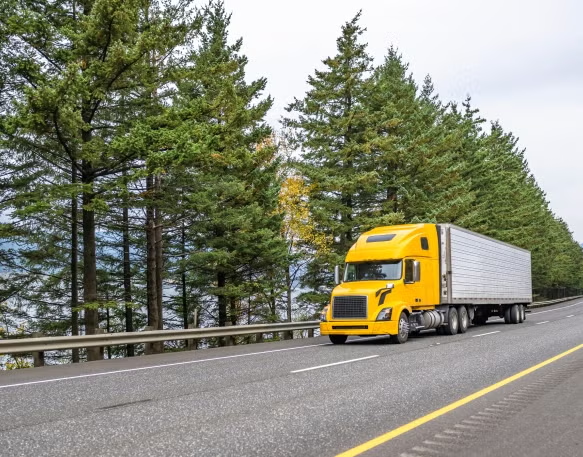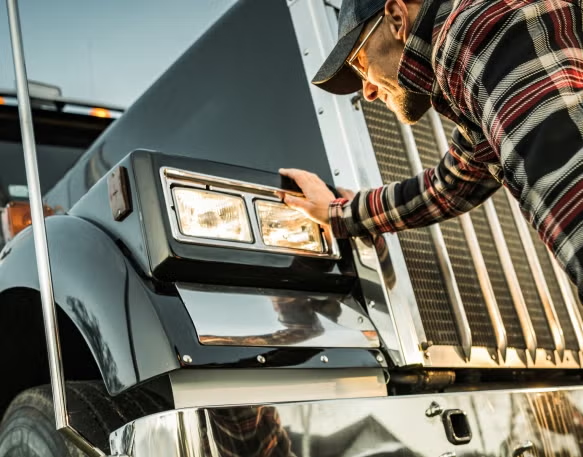As with any business, creating a successful trucking business requires planning. You can’t just wing it and hope for the best. You might end up hemorrhaging money or, even worse, breaking laws if you try that. In most cases, you won’t be able to get your company off the ground in the first place without some planning because lenders, investors, and financing partners usually want to see a detailed trucking company business plan before providing you with the capital to purchase trucks, equipment, and everything else you need to launch your business.
All of that means that you’ll need to spend a little time preparing and writing up a business plan for your trucking company — but the good news is that your work will pay off! Not only can a comprehensive business plan for trucking help assure potential investors that you know what you’re doing, but it also serves as a road map of all the practical and logistical steps you’ll need to take to start your business off strong.
If you’re a little lost when it comes to writing a trucking business plan, don’t worry! In this guide, we’ll go over what you need to do and the information you need to know before writing your business plan, what to include in your business plan, and more, so you can start your trucking business off on the right foot.
What you need to do before writing your trucking business plan
Before you begin writing your trucking company business plan, you need to ensure that your business is an official business!
First, you’ll have to register your trucking business with your business name and choose a business structure. Your business structure selection can impact your taxes, required paperwork, personal liability, and ability to raise money, so you need to do your research and choose wisely. You can register your company as a sole proprietorship with a DBA, a partnership, a corporation, or a limited liability company (LLC).
Once you’ve registered your business, you need to apply for an employer identification number (EIN) from the IRS. They will use this nine-digit number for identification purposes and for general taxation. When it comes to fuel taxes, you’ll also need to set up an International Fuel Tax Agreement (IFTA) account. This will normalize fuel taxes in all states and Canadian provinces.
In addition to your tax registration, you’ll also need to register your trucking business with the U.S. Department of Transportation (DOT) to receive your DOT number. This involves providing information on which states you’ll operate in, how many trucks you’ll have, your vehicle weight, what materials you plan on hauling, and more. All of that means applying for a DOT number can be a complicated, time-consuming process. If you need some help, DAT can handle your DOT number application, so you can focus on starting your business instead of the paperwork.
Before hitting the road, you’ll also need to apply for a motor carrier (MC) number from the Federal Motor Carrier Safety Administration (FMCSA). An MC number will allow you to haul loads in interstate commerce in exchange for money or to deliver hazardous materials no matter where you drive. While getting your MC number can be complicated and stressful on your own, it’s simple with DAT.
However, your MC number isn’t the only thing you’ll need from the FMCSA. You’ll also need to file a BOC-3 form and specify a process agent before you can start carrying freight. Filing this form will give you a legal presence in every state where you operate and ensure the public can reach you for any legal matters down the road.
That’s not all, though. You’ll also need insurance. Insurance is essential for any business, but it’s especially vital for a trucking company. After all, so much is out of your control, from inclement weather to poorly maintained roads and distracted drivers. Accidents happen, and you must protect your business from financial fallout. We recommend carrying $750,000 in primary liability insurance, $100,000 in cargo insurance, and $1 million in liability insurance.
Finally, you should file a Unified Carrier Registration (UCR) application before starting your business plan and pay an annual registration fee based on the size of your fleet. This money will provide supplemental funding for state highway motor carrier registration, education, and safety programs.
What to know before creating your trucking business plan
In addition to having all your ducks in a row when it comes to the legalities of creating a business, you’ll need business knowledge and industry knowledge before you can create a sound trucking business plan — and that means conducting research.
You’ll want to learn about cash flow, return on investment, profit and loss, variable and fixed costs, and other business terms that will prove essential to your success. Doing the legwork now will come in handy later. Not only will you be more equipped to run and understand your business, but you’ll also be able to increase your credibility and show potential investors that you know what you’re doing.
More specifically, when it comes to writing a business plan, for trucking company leaders it’s important to:
- Take stock of your assets and determine what they are worth.
- Keep track of your liabilities.
- Understand the difference between spot market and contract market rates.
- Research the going rates in freight lanes.
- Consider your projected average fuel cost, miles driven, and miles per gallon to determine operating costs.
- Calculate how much cash flow your business needs to succeed.
- Learn how to calculate your profit margin.
- Know where to find loads (The DAT Load Board can make all the difference!).
- Decide whether you’ll add fuel surcharges to your rates.
- Learn the basics of accounting.
- Develop operating procedures based on the type of cargo you intend to haul, its origin, and its destination.
By thinking about these things, gaining industry knowledge, and possessing general business acumen before writing the business plan for your trucking company, you can better understand your business and determine where to set your rates to ensure your business is profitable.
How to write your trucking company business plan
After you’ve filed all your forms and educated yourself on business and industry concepts, it’s time to write your trucking business plan! You’ll want to create a tailored business plan for your trucking company that will clearly showcase who you are, what you’re doing, and how your business differs from the competition.
It may sound intimidating, but the good news is that you don’t have to start your business plan for trucking entirely from scratch. In fact, you shouldn’t. Investors are used to seeing specific elements in certain orders, so make sure to include these elements in your business plan:
An executive summary
This will serve as a brief overview of your company, its unique offerings, and your plans for the future. You’ll want to include information on your mission, finances, growth plans, and anything else you need to explain why you’re starting your business and why it will succeed.
Since your executive summary will be the first thing people will see, you want to make an excellent first impression. Otherwise, you might lose their attention before they get to the meat of your business plan.
A company description
Another essential part of any trucking business plan is the company description. This will serve as your About Us section, so don’t be afraid to share who you are, what your business will do, who your ideal client is, how you plan to connect with them, and more. You can go a little deeper into your company’s mission and provide information on your experience in the trucking industry in this section as well. Also, be sure to include what sets you apart from the crowd, whether that’s your outstanding employees, freight specialization, or area of operations.
An operational plan
In this part of your business plan for trucking, you’ll want to go over how your business will work and what steps you’ll take to make your business as profitable as possible. In your operational plan section, answer these questions: How will you handle dispatching? What about routing? Will there be other drivers? Will you use load boards, freight factoring, or accounting software to save time and money? What about fuel cards? It’s critical that you’ve answered this question for yourself and for anyone else who may read your business plan before you can think about getting on the road.
Details of your services
In this section of your trucking business plan, you’ll want to detail the services you’ll offer to future customers, how and where you’ll execute your services, which industries you’ll serve, and how you’ll meet demand. Make sure to think about things through the lens of your customers and the problems you’ll solve for them.
A market analysis
The market analysis portion of your trucking business plan is essential. After all, the trucking market is crowded, which means you need to do your research and know exactly what to expect. The market analysis section is also your chance to show investors that you’re up-to-date with industry trends and market demands and know how to gain an advantage over your competitors.
You’ll want to include:
- An industry description and outlook: This is where you can provide data on the current and future states of the trucking industry in terms of dollars and carriers. Make sure to talk about the number of competitors, the biggest carriers and shippers, the industry’s current annual revenue, other trends, and how the trucking industry will evolve over the next decade.
- Your target market: Here, you can concentrate on your niche market. For example, if you plan on using reefers to deliver refrigerated loads, you can provide information on your niche’s market size and competitors.
- Competitor analysis: You’ll want to include information about your competitors, their strengths and weaknesses, and their customers. Then, you can dive into how you’ll fill the gaps they aren’t targeting or why customers will choose your company over the competition.
- Pricing and margins information: Here, you can provide details on how you plan on pricing your services, the margins you need to become a profitable business, and how your prices will compare to competitors.
- Industry regulations: While developing a compliance plan for federal and state laws like Hours of Service limits, required permits and licenses, and fuel emissions requirements can seem tedious, it’s a non-negotiable. So, explain the regulations you’ll need to follow and create a clear compliance plan ahead of time.
Information on management and personnel
You’ll also want to go over your approach to hiring, onboarding, and retaining office workers, dispatchers, or additional drivers in your business plan for trucking company success. After all, behind every business is its people — and if you don’t have the right people on your team, your business won’t succeed.
The importance of your people can’t be overemphasized. With the help of safe, qualified drivers, you can help establish your business as a trustworthy carrier and eventually gain new shippers and expand your operations. On the other hand, if you hire a non-compliant carrier, you might get into trouble with shippers and brokers.
Sales and marketing strategies
Effective sales and marketing strategies can make all the difference, especially in today’s crowded market.
When it comes to marketing, detail how you’ll market your business, whether that means advertising on trucking industry websites, attending trade shows, buying email lists, or starting a social media page. Also, discuss the specific clients you want to target, and don’t forget to include a marketing budget! If you do all of these things in advance, you can develop a solid marketing strategy that will reach prospective customers at the right time, get you noticed, and help you build a loyal customer base.
As for your sales strategy, you’ll want to provide details on your sales operations, whether that means hiring a sales force or using a third-party sales company. Either way, you’ll want to include a budget, sales quotas, and details on how your salespeople will find and contact prospects.
Financial projections
Any good business plan for trucking company success needs to include a discussion of the company’s finances and its ability to meet fiscal targets. Consider including a profit-loss statement, a sales forecast, a cash flow statement, a balance sheet, a break-even analysis, and financial projections in your trucking business plan.
A good rule of thumb is to provide financial projections for five years out. This will show investors you have a plan once your business gets going. So, if you plan on hiring new drivers down the road or perhaps purchasing reefers so you can get in on temperature-sensitive loads, let investors know ahead of time!
A funding request
Funding requests are optional, but if you need money from investors or partners, it’s a good idea to include this section in your trucking business plan! After all, people won’t give you money if they don’t know you need it.
Finding out how much money you need is simple! Just subtract the amount of money you currently have from your projected costs and include that number in the funding request section. You can also list your assets and personal contributions to show investors you’re serious about your business. Above all, be specific about the money you need and how you’ll use it.
Building a successful trucking business with DAT
Starting a trucking business is a dream for many people, but you’ll need to put in a little work to turn that dream into a reality. That includes taking the time to really understand your industry and creating a sound trucking business plan.
Once you’ve set up your business and written a trucking company business plan, you’re ready to find loads and hit the road. DAT is here to help! Whether you need to view current lane rates to discover where your trucks are in high demand, are searching for loads from quality brokers and shippers, or want to save on fuel or factor with one of our trusted partners to improve your cash flow, DAT has you covered. Not only do we have decades of experience helping people get their start in trucking, but we’re also the largest on-demand freight marketplace in the industry, so you know you can always find a load that meets your business’ needs.
Ready to find freight faster, boost your negotiating game, get paid more quickly, and more? Check out our carrier services today!
Find freight quickly with the DAT load board!
Picking up the right loads before the competition can make or break your business. However, finding loads takes time and effort.
With the DAT load board, you can filter through loads to find the perfect match for your needs. Sign up today to start hauling the freight you want!




